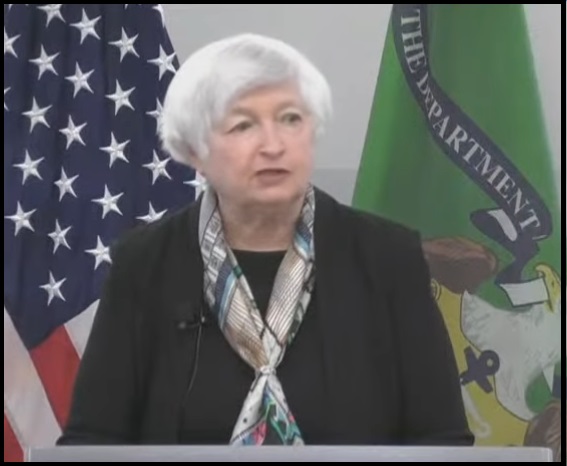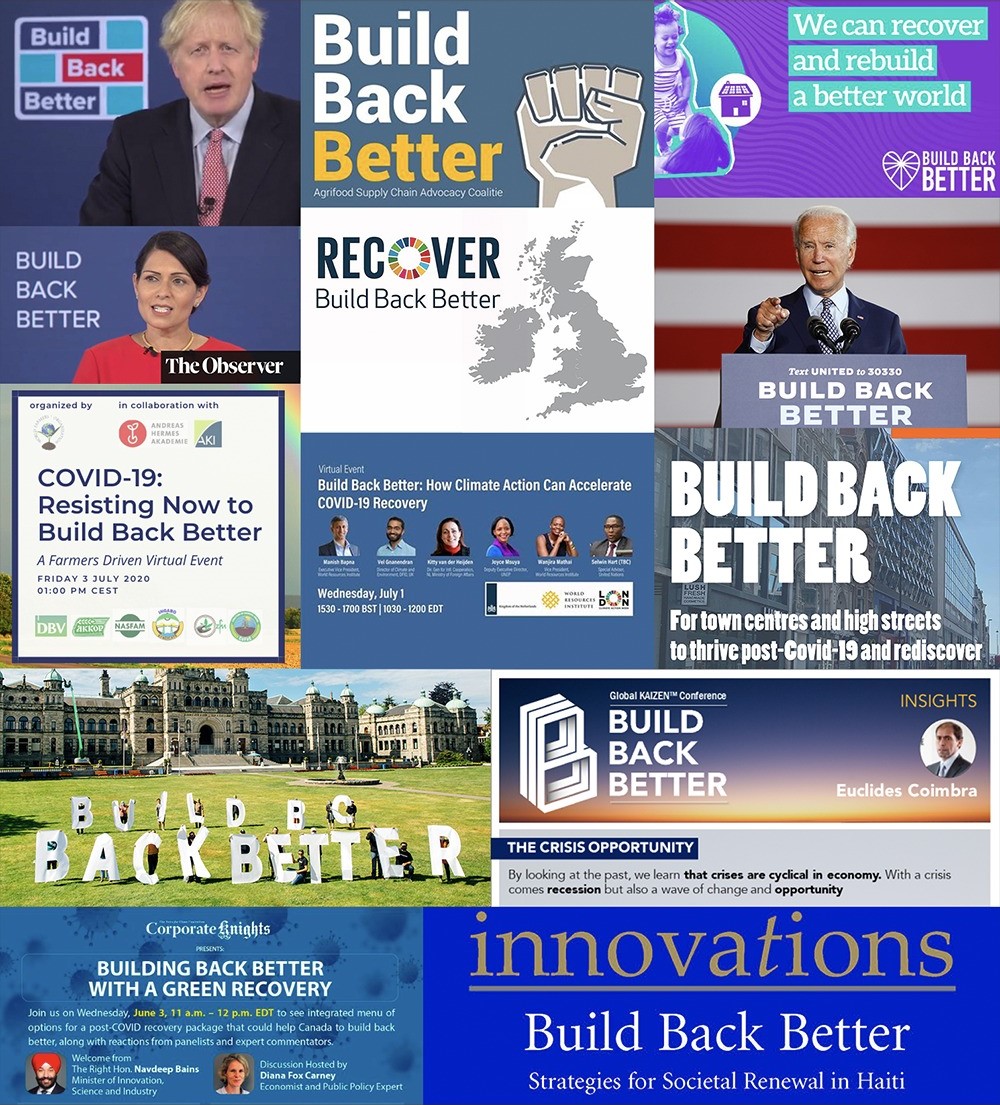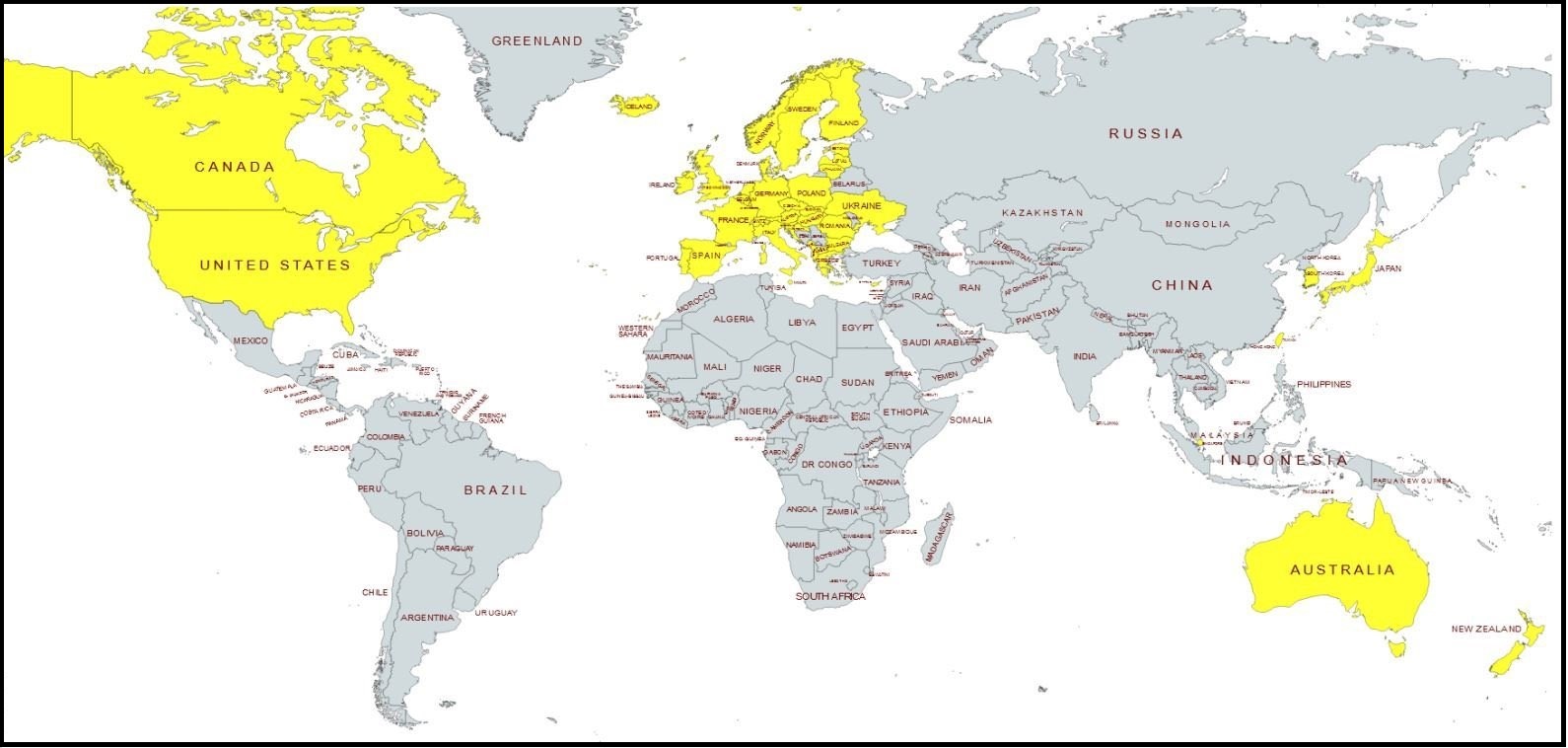Treasury Secretary Janet Yellen delivered a remarkable speech today outlining “the future of the international order,” in the aftermath of the global pandemic and the current conflict in Ukraine. Within the speech, Yellen outlines the priorities of the United States according to the current administration and the international financial mechanisms that she controls.
 The speech is quite jaw-dropping when you consider the nature of her position, and the fact that she is an unelected bureaucrat within government.
The speech is quite jaw-dropping when you consider the nature of her position, and the fact that she is an unelected bureaucrat within government.
As you read the speech {Transcript Here}, keep in mind she is not the President of the United States, or the commissioner of the New World Order, yet she presents herself as authorized to control the geopolitical constructs of the Biden administration. The hubris is astounding.
Secretary Yellen: outlines the goals and objectives of the international order, predicts a concerning global famine, warns against the cleaving of financial mechanisms for international trade as an outcome of the Ukraine conflict, threatens any nation who does not support the western political alliance and outlines the need for decarbonization of the global economy.
Yellen expresses all of these powers from the position of a U.S. Treasury Secretary – the equivalent of a government financial minister. Speech highlights with emphasis mine:
(Transcript) – […] “Russia’s horrific conduct has violated international law, including core tenets of the UN Charter—challenging countries to demonstrate where they stand with respect to the international order that has been built since World War II. Therefore, when I speak about a changed global outlook, I’m not just talking about growth forecasts. I’m also referring to our conception of international cooperation going forward.
I will focus my remarks today on the significance of international cooperation in this current environment and for our future.
[…] With Attorney General Garland, I convened a novel taskforce of law enforcement and finance ministry leaders from G7 and partner countries to advance our efforts. […] Rest assured, until Putin ends his heinous war of choice, the Biden Administration will work with our partners to push Russia further towards economic, financial, and strategic isolation.
[…] When Russia made the decision to invade Ukraine, it predestined an exit from the global financial system. Russian leaders knew that we would impose severe sanctions. […] We are now seeing higher commodity prices that have added to global inflationary pressures and are posing threats to energy and food security, trade flows, and external balances across many countries.
[…] The ultimate outcome for the global economy of course depends on the path of the war. Russia could end this unnecessary war and the near-term impact could be contained.
[…] While many countries have taken a unified stand against Russia’s actions and many companies have quickly and voluntarily severed business relationships with Russia, some countries and companies have not. Let me now say a few words to those countries who are currently sitting on the fence, perhaps seeing an opportunity to gain by preserving their relationship with Russia and backfilling the void left by others. Such motivations are short-sighted. The future of our international order, both for peaceful security and economic prosperity, is at stake.
[…] The Russian invasion of Ukraine has dramatically demonstrated the need for us to stand together to defend our international order and protect the peace and prosperity that it has conferred on advanced and developing countries alike. […] On some issues, like trade and competitiveness, this will involve bringing together partners that are committed to a set of core values and principles.
[…] we need to modernize the multilateral approach we have used to build trade integration.
[…] we should implement last year’s global tax deal. Some 137 countries—representing nearly 95 percent of the world’s GDP—have agreed to rewrite the international tax rules to impose a global minimum tax on corporate foreign earnings and to partially reallocate taxing rights from countries where companies are headquartered to those where they sell goods and services.
[…] the economic and financial response to the global financial crisis in 2008-2009 was too timid and short-lived. With inadequate global liquidity, the crisis caused lasting damage. In response to the pandemic, the IMF acted creatively to support poorer countries. […] Experts put the funding needs in the trillions, and we have so far been working in billions. The irony of the situation is that while the world has been awash in savings—so much so that real interest rates have been falling for several decades—we have not been able to find the capital needed for investments in education, healthcare, and infrastructure.
[…] We know we have not yet done enough in terms of mitigation, adaptation, green technology innovation and adoption, and funding for those efforts. […] We must redouble our efforts to decarbonize our economies, recognizing that countries will use a range of tools—including carbon pricing, regulation, and subsidies—to achieve needed emissions reductions. Because those approaches will have quite different consequences for the costs of production, we will see differing impacts on trade competitiveness. We will need to work together to avoid trade tensions and in time to coordinate and harmonize our approaches.
[…] Some may say that now is not the right time to think big. Indeed, we are in the middle of Russia’s war in Ukraine, alongside the lingering fight against a global pandemic and a long list of other initiatives underway. Yet, I see this as the right the time to work to address the gaps in our international financial system that we are witnessing in real time. […] we ought not wait for a new normal. We should begin to shape a better future today.” {Read Full Transcript}
Think carefully about what you just read, and then remember the previous warning:
 [CTH March 23, 2022] A Build Back Better society, or “great reset”, is factually underway as triggered by the gateway of SARS-CoV-2 and the massive spending by western nations to subsidize the lockdowns, shut-downs, economic closures and forced unemployment.
[CTH March 23, 2022] A Build Back Better society, or “great reset”, is factually underway as triggered by the gateway of SARS-CoV-2 and the massive spending by western nations to subsidize the lockdowns, shut-downs, economic closures and forced unemployment.
Global inflation is being driven not only by the American spending spree, but also by the massive government spending programs of the EU, U.K, New Zealand, Australia, Canada and many western nations.
The bills for those subsidies and bailouts are due. The labor of the citizens is going to have to pay those bills, while simultaneously we deal with inflation and massive debt balances on all nations’ balance sheets.
Into this mix comes the very real possibility of a declining U.S. trade dollar, as a result of geopolitical conflict between the west and Russia, China, Iran and OPEC in the geography of Ukraine. The financial sanctions by NATO and western allies have factually created a rift in currency exchange valuations.
As the proverbial west hammers those sanctions even harder and more deliberately, what they are doing is creating a stronger and greater likelihood that the dollar will be removed as the global trade currency, and we will enter a phase where two sets of nations exist:
One set of nations will run their economy on oil, gas and fossil fuels. The other set of nations will be focused on running their economic engine on the premise of sustainability, or renewable energy.
The sanctions toward Russia actually help to drive this chasm even wider.
To me, this looks entirely purposeful – done by specific intent and design.
Two world groupings. One group, oil-based energy (traditional) – let’s label them the RED GROUP; and one group GREEN energy (the build back better plan). It is not accidental these two groups hold similar internal geopolitical views and perspectives.
♦ The important part to see is… there are going to be two sets of nations with two structurally different economies. A red group and a green group.
What Treasury Secretary Janet Yellen outlines in that speech is the geopolitics of this exact cleaving. Also worth noting, We The People represent the carbon she seeks to eliminate.

Did Yellen sing the “International” Communist Anthem before or after her comment? I thought her job was to be concerned with the US economy, not he international economy!
When the US Treasury Secretary talks about “international order” and not about currency valuations, you should take note.
This was a scared speech, not scary but scared.
Putin/ Russia have been getting away from US dollars and US/Western world cannot have it. It’s not about Ukraine anymore. It’s about the reserve currency.
Yellen, in her position, should be talking about US debt, interest rates and currency values and inflation.
And yet, not a word.
Take note my friends.
RIGHT. More and more SCAMMING by the scam scum that are SUPPOSED “leaders”. Clearly, the only “leading” they want to do is LEAD AMERICA TO SELF-DESTRUCTION.
A criminal mafia has been installed via overthrows and election fraud worldwide. Schwab bragged about “infiltrating” western governments. These crooks are not legitimate leaders, or even rulers. They are a gang of loathsome thugs.
Demented grandma in charge of the world economy? Dear Lord, save us!
Wasn’t it elmer fudd that sounds like the male version of her? She sounds like she looks: a bubbling pile of fat, saying absolutely NOTHING WORTHWHILE. (which is what this whole “international agenda” is: ABSOLUTELY NOTHING WORTHWHILE.)
what about Canada’s horrific conduct or Australia’s or even the United States’s horrific conduct! Democrat/Rino Horrific conduct. New world order is cover your head, don’t go nowhere, don’t speak and don’t eat
NEW WORLD ORDER is the WORST OF THE WORST.
We need to De-Yellenize our government
Someone should tell her it’s time to STFU
At first glance, I thought the article’s banner read: “..Need to decarbonize our enemies.” 😳
a GREAT REMARK was: “They’re so against carbon because CARBON IS NEEDED FOR LIFE, and they’re SO AGAINST LIFE.”, as they even say, themselves. The “lives” they need to remove are THEIR OWN worthless existences.
Global inflation is being driven not only by the American spending spree, but also by the massive government spending programs of the EU, U.K, New Zealand, Australia, Canada and many western nations.
Notice the “Five Eyes” nations are at the core of this malicious reckless foolishness.
Degenerated from “protecting” to dictating.
The traitors that have been ruling America have PRETENDED to be about “protection”. They have zero interest in protecting anything but their own dictatorships and how much they can steal, kill, and destroy. (Sound familiar?: The Bible says it about satan, their father.)
Yellen’s simply the modern day Charley McCarthy doll sitting on her ventriloquist’s lap. It is actually Karl Shaub who has his arm up her jacket and is causing her mouth to move.
I know most here think this is the scariest speech a Treasury Secretary has ever given. So far out of her lane.
I find it a scared speech, not scary. Methinks many countries will feel the same.
Yellin is threatening countries to fall in line here and using Russia as the reason. It’s not difficult to see this could be used on any country for any reason.
All this is about the dollar as the reserve currency. And quite frankly, she seems scared.
Take note
And why they froth at the mouth over Putin.
Yellen will be at the forefront of a ruined US petroldollar. Russia will be the ruin of US and China will own U.S. by 2028.
NEVER GIVE UP !!
What we need to do is carbonize the ruling elites. Is that the right word for burn them all???
I’d like to see her and her fellow New World Order thugs in a spider hole like Saddam.
Cannot stomach her tone as she speaks standing on a mountain of debt that makes Everest look like an ant hill considering it was her and her parasites in Washington that created the debt , destroyed the tax base that once economically drove this nation to the top .
Yet in 50 years the BIG CLUB has the US circling the drain drowning in worthless dollars .
Now the same group that enriched themselves and the connected few have a plandemic to fix it .
The ones who don’t die from the vaccines they will starve or kill in a war they instigate !
PS: don’t give me that we were the only economy standing after WW2 and now we have competition because that’s where our government failed continuously and now openly telling us we must pay and suffer for their personal treasonous pursuit of wealth leaving us the bill to pay for your total failures !
Great idea let’s bankrupt all government pension plans like you did most Americans working in industries you allowed to got to foreign countries ignoring that you just crushed the tax base that paid school teachers , cops , fireman among all other government services .
Destroying working Americans as government employees retire with life left to live and the means to do it while the debt goes on
TERMINOLOGY WORTH REPEATING: it was her and her parasites in Washington that created the debt. war they instigate we must pay and suffer for their personal treasonous pursuit of wealth leaving us the bill to pay for your total failures ! And speaking of WW2, the picture that has emerged is that America didn’t exactly win, as the propaganda has said: TRAITORS IN HIGH PLACES IN U.S. (such as Prescott Bush, had been colluding with foreign enemies, AND BROUGHT THEM HERE to UNDERMINE AMERICA EVER SINCE, and that’s why we have had traitors in U.S. POWER, EVER SINCE. {Ever wonder why U.S. govt. has gotten more and more treasonous since WW II. The trend has been TREASON because of INFILTRATION.}
THEIR “International Order” intends to depopulate the globe, steal all property, make us eat bugs and freeze while they fly on private jets, live on huge estates, pedo on children and eat like kings.
THEIR “International Order” is THEIRS, NOT ours. There is no room for us in their “order”.